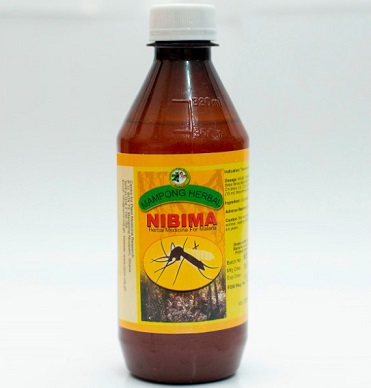COVID-19 Herbs: Ghanaian Herbal Medicines Nibima And Immunim Shows Potential As A SARS-CoV-2 Antiviral In Reported Case Study.
Nikhil Prasad Fact checked by:Thailand Medical Nes Team Feb 28, 2024 1 year, 1 month, 3 weeks, 6 days, 10 hours, 3 minutes ago
COVID-19 Herbs: In the relentless fight against the global COVID-19 pandemic, researchers and medical professionals worldwide are exploring diverse approaches to manage the virus's impact. This includes investigating the potential of herbal medicines to complement traditional treatments. In this context, the Centre for Plant Medicine Research in Mampong-Akuapem, Ghana, has documented a case report on the effective use of Nibima and Immunim, two herbal formulations, in the management of mild COVID-19.
 Ghanaian Herbal Medicines Nibima And Immunim Shows
Ghanaian Herbal Medicines Nibima And Immunim Shows
Potential As A SARS-CoV-2 Antiviral In Reported Case Study.
Background
COVID-19, caused by the SARS-CoV-2 virus, has posed a significant threat to global health since its emergence. With the disease declared a pandemic by the World Health Organization in March 2020, the search for effective treatments has been a top priority. The virus primarily targets the respiratory system, ranging from mild symptoms to severe complications, making it crucial to explore various therapeutic options.
Ghana, like many other countries, has implemented standard treatments for COVID-19, including antivirals, anti-inflammatories, and immunomodulators. However, the surge in the use of herbal medicines in response to the pandemic has brought attention to the need for safe, effective, and accessible treatments. The World Health Organization recommends rigorous assessments of medicinal plants' safety profiles and efficacy before considering them as potential treatments.
Nibima and Immunim, both produced under good manufacturing practices by the Centre for Plant Medicine Research, have garnered attention due to their antiviral, anti-inflammatory, and antioxidant properties. The herbal formulations are derived from Cryptolepis sanguinolenta and Azadirachta indica, respectively, showcasing their potential in the management of COVID-19.
Both Azadirachta indica commonly called Neem in India and Cryptolepis sanguinolenta have been studied as potential
COVID-19 Herbs to treat COVID-19 due to their antiviral, anti-inflammatory and immunomodulatory properties.
https://www.sciencedirect.com/science/article/pii/S2468227622000928
https://journals.plos.org/plosone/article?id=10.1371/journal.pone.0282729
https://www.hindawi.com/journals/bmri/2022/5714035/
https://www.sciencedirect.com/science/article/pii/S0042682222000022
https://osf.io/preprints/osf/jvrf2
t;
https://pubs.aip.org/aip/acp/article-abstract/2634/1/020082/2871145/In-silico-study-of-mechanism-of-neem-leaf?redirectedFrom=fulltext
https://ayushportal.nic.in/pdf/books/6831.pdf
https://www.hindawi.com/journals/bmri/2020/5324560/
https://www.researchgate.net/figure/Structures-of-Cryptolepis-sanguinolenta-alkaloids-used-in-this-study_fig1_344346763
Case Presentation
The case involves a 52-year-old female who presented at the Dr. Oku Ampofo Memorial Clinic with a three-day history of loss of smell and persistent headaches. The patient tested positive for COVID-19 in the SARS-CoV-2 Ag test and Typhoid rapid antibody test. While routine laboratory tests showed no remarkable findings, the patient was prescribed a 60 mL three times daily dose of Nibima and a 5 mL in 40 mL of warm water dose of Immunim for seven days.
After the seven-day treatment regimen, the patient experienced a recovery of the sense of smell, regained appetite, and tested negative for COVID-19. Notably, the cough, though reduced, persisted. This case marks the first documented instance of managing COVID-19 with herbal medicines in Ghana, highlighting the potential efficacy of Nibima and Immunim.
Discussion
As the COVID-19 pandemic persists, the need for efficient therapeutics becomes paramount, especially with the emergence of new variants. The case report presented here underscores the successful management of mild COVID-19 using herbal preparations, shedding light on potential alternative treatments.
The clinical manifestation of COVID-19 varies widely, from asymptomatic cases to severe illness requiring intensive care. In this case, the patients, a 52-year-old woman and her 55-year-old husband, both exhibited mild symptoms, allowing for the initiation of herbal treatment. The choice of Nibima and Immunim was based on their documented antiviral, anti-inflammatory, and immunomodulating properties.
The ongoing clinical trials and research on Cryptolepine, the main alkaloid in Nibima, demonstrate its potential inhibitory activity against key components of SARS-CoV-2. The repurposing of Azadirachta indica and Cryptolepis sanguinolenta, both traditionally used for malaria, is justified given their alkaloid content and known antiviral properties.
Conclusion
This case report presents a groundbreaking step in the management of COVID-19 by showcasing the successful use of Ghanaian herbal medicines Nibima and Immunim. While the limitations of the study are acknowledged, including the need for further testing to confirm the presence of SARS-CoV-2 and its variants, the findings suggest a potential avenue for exploring herbal treatments in the broader context of COVID-19 management.
The Centre for Plant Medicine Research advocates for larger controlled trials to validate and ascertain these findings, paving the way for the repurposing of Nibima and Immunim as viable treatments for mild COVID-19. As the world grapples with the ongoing pandemic, diverse and innovative approaches are crucial, and the exploration of herbal medicines represents a significant step forward in the pursuit of effective COVID-19 therapeutics.
The cases report was published in the peer reviewed journal: Clinical Case Reports (Wiley).
https://onlinelibrary.wiley.com/doi/10.1002/ccr3.8539
For the latest on
COVID-19 Herbs, keep on logging to Thailand Medical News.
